人教版七年级上册英语Unit6 Do you like bananas--讲义
人教版七年级上册英语讲义 Unit 6 Do you like bananas

Unit 6 Do you like bananas? 讲义一、【重点单词】banana /bə'nɑ:nə/香蕉hamburger /'hæmbɜ:(r)ɡə(r)/汉堡包tomato /tə'mɑ:təʊ/西红柿ice-cream /,aɪs'kri:m/冰激凌salad /'sæləd/沙拉strawberry /'strɔ:berɪ/草莓pear /peə(r)/梨milk /mɪlk/牛奶bread /bred/面包birthday /'bɜ:(r)θdeɪ/生日dinner /'dɪnə(r)/(中午或晚上吃的)正餐week /wi:k/周;星期food /fu:d/食物sure /ʃʊə(r)/当然;肯定;一定burger /'bɜ:(r)ɡə(r)/汉堡包= hamburgervegetable /'veʤtəbəl/蔬菜fruit /fru:t/水果right /raɪt/正确的;适当的apple /'æpl/苹果then /ðen/那么egg /eɡ/蛋;鸡蛋carrot /'kærət/胡萝卜rice /raɪs/大米;米饭chicken /'ʧɪkɪn/ji鸡肉so /səʊ/ (引出评论或问题)那么breakfast /'brekfəst/早餐;早饭lunch /lʌnʧ/午餐star /stɑ:(r)/明星;星星eat /i:t/吃well /wel/好;令人满意的habit /'hæbɪt/习惯healthy /'helθi/健康的really /'ri:əli/真正地question /'kwesʧən/问题want /wɒnt/需要;想要be /bi:/变成fat /fæt/肥的;肥胖的二、【重点短语】1. John ’s birthday dinner 约翰的生日宴会2. vegetable salad 蔬菜沙拉3. two tomatoes 两个西红柿4. eat well 吃得营养5. think about 考虑6. eat/have breakfast/lunch/dinner 吃早/午/晚饭7. sports stars 体育明星8. the volleyball star 排球明星9. ask sb. about sth. 问某人某事10. like hamburgers/ice-cream 喜欢汉堡包/冰淇淋11. like eating eggs 喜欢吃鸡蛋12. her eating habits 她的饮食习惯13. be (not) healthy (不)健康14. one last question 最后一个问题15. healthy food 健康食物16. after breakfast/lunch/dinner 早/午/晚饭后17.one last question 最后一个问题18.some fruit 一些水果19.for dinner 作为晚餐20.how about 怎么样三、【重点句型】1.—Do you like salad? 你喜欢沙拉吗?一Yes,I do. /No, I don’t. 是的,我喜欢。
七年级英语上册人教版Unit6Do you like bananas?单元教案
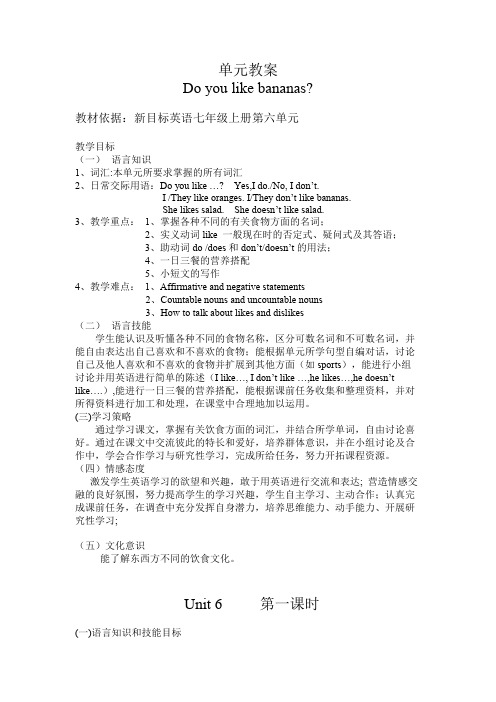
单元教案Do you like bananas?教材依据:新目标英语七年级上册第六单元教学目标(一)语言知识1、词汇:本单元所要求掌握的所有词汇2、日常交际用语:Do you like …? Yes,I do./No, I don’t.I /They like oranges. I/They don’t like bananas.She likes salad. She doesn’t like salad.3、教学重点:1、掌握各种不同的有关食物方面的名词;2、实义动词like 一般现在时的否定式、疑问式及其答语;3、助动词do /does和don’t/doesn’t的用法;4、一日三餐的营养搭配5、小短文的写作4、教学难点:1、Affirmative and negative statements2、Countable nouns and uncountable nouns3、How to talk about likes and dislikes(二)语言技能学生能认识及听懂各种不同的食物名称,区分可数名词和不可数名词,并能自由表达出自己喜欢和不喜欢的食物;能根据单元所学句型自编对话,讨论自己及他人喜欢和不喜欢的食物并扩展到其他方面(如sports),能进行小组讨论并用英语进行简单的陈述(I like…, I don’t like …,he likes…,he doesn’t like….),能进行一日三餐的营养搭配,能根据课前任务收集和整理资料,并对所得资料进行加工和处理,在课堂中合理地加以运用。
(三)学习策略通过学习课文,掌握有关饮食方面的词汇,并结合所学单词,自由讨论喜好。
通过在课文中交流彼此的特长和爱好,培养群体意识,并在小组讨论及合作中,学会合作学习与研究性学习,完成所给任务,努力开拓课程资源。
(四)情感态度激发学生英语学习的欲望和兴趣,敢于用英语进行交流和表达; 营造情感交融的良好氛围,努力提高学生的学习兴趣,学生自主学习、主动合作;认真完成课前任务,在调查中充分发挥自身潜力,培养思维能力、动手能力、开展研究性学习;(五)文化意识能了解东西方不同的饮食文化。
人教版七年级上册英语例题与讲解:Unit6DoyoulikebananasSectionA

初中英语学习材料madeofjingetiejiUnit 6 Do you like bananas?突破词汇 Section A sure adv . 当然;肯定;一定→P95 Section B breakfast n . 早餐;早饭 →P102 How about...?(提出建议)……怎么样?→P96 healthy adj . 健康的 →P103 Section B eat v . 吃→P101 want v .需要;想要 →P103 well adv . 好;令人满意地→P102 fat adj . 肥的;肥胖的 →P104 把握句型 1.Do you like oranges?你喜欢橙子吗?2.Sure.How about burgers ,vegetable salad ,and some fruit?好吧。
咱们吃汉堡、蔬菜沙拉和水果怎么样?3.I don't want to be fat.我可不想变胖。
熟悉 语法 1.实义动词的一般现在时。
2.名词。
学会 交际 学会在日常生活中谈论好恶。
写作 练笔 学写某人喜爱或厌恶某物的短文。
Section A2dJack :Hey ,John's birthday dinner is next week.[1]Let's think about the food. Tom :[2]Sure.How about burgers ,vegetable salad ,and some fruit? Bill :Sounds good.John likes hamburgers.Jack :Oh ,I don't like salad.Bill :But John likes salad ,and it's his birthday.Jack :Yes ,you're right.What about the fruit?Tom :I think John likes strawberries and apples.Bill :OK.[3]Let's have strawberries and apples then.2d杰克:嗨,约翰的生日聚餐就在下周。
七年级人教版英语上册Unit6Doyoulikebananas?全单元教案

Unit 6Do you like bananas?Period 1(Section A 1a-1c)Teaching aims1. Learn words and be able to say, read and write them:orange(s), banana(s), strawberry, strawberries, pear(s), apple(s),tomato(es), carrot(s), vegetable(s), hamburger(s), egg(s), ice-cream(s),salad(s), bread, chicken2. Be able to talk about likes and dislikes by using:I/We/They like oranges. He/She likes oranges.I /We/They don’t likebananas. He/She doesn’t like hamburgers.Do you like salad? Yes, I do./No, I don’t.Does he/she like tomatoes? Yes, he/she does. / No, he/she doesn’t.3.Understand the difference between countable nouns and uncountable nouns.Teaching key and difficult points:1.Learn these words and be able to say, read and write them:2.Be able to talk about likes and dislikes by using:I/We/They like oranges. He/She likes oranges.I /We/They don’t likebananas. He/She doesn’t like hamburgers.Do you like salad? Yes, I do./No, I don’t.Does he/she like tomatoes? Yes, he/she does. / No, he/she doesn’t. Moral objects(1)To call students ’ attention to otherserests and’ei n ablet themto care more about classmates.(2)To improve Sts ’communicating skills and enable them to keeptheir health.教学设计备注Step 1. Warm-up and revision(1)Daily greeting to the students(2)Revision: What ’s this/that in English ? What coloris it?T:What ’s this in English? (show a picture of andorange)T:What color is it?Step 2. Presentation –New words.(1)Go on asking: What ’s this/that in English ? Whatcolor is it?T:What ’s this in English? (show a picture of anapple and if the student don’t know it, show thephonetic symbol of the word.)T: Spell it, please.S: A-P-P-L-E.T: What color is it?S: It ’s red.(Present the other three words as above: pear,strawberry, banana )T:We can call all of these things fruit . (Teach the newword “fruit ”.)Show pictures and ask the Ss “What arethese/those? ”and ask the SS to spell the pluralforms of these words: oranges, apples, pears,strawberries, bananas.(2)Repeat step (1) to present: carrot, carrots,tomato, tomatoes and vegetable, vegetables.(3)Present some more words by showing pictures. Get theSs to make an effort to pro nounce and spell the new words.Bread, hamburger ,hamburgers, milk, ice-cream,ice-creams, salad, chicken ,an egg, eggsWe can call all of these things food:食物3.Memory Challenge: Who has the best eyes?(1)Show the pictures, and say the plural forms of the nouns andsome uncountable noun.(2)Summarize. 可数名词有复数形式 , 不可数名词一般没有复数形式Step 3Presentation Target language 11. Show the pictures and say:I like tomatoes, but I don’ t like bread.2.Let students say:I like, but I don’t like ....3. Show the pictures and say:She likes bread, but she doesn’t like milk.He likes chicken, but he doesn’t like eggs.4.Let students say: He/She likes , but he/she doesn’tlike ....According Ss’answers and say:5. Sing a chant:Bananas, bananas, I like bananas! Salad, salad, I like salad!Strawberries, strawberries,I don ’t like strawberries!Pears, pears, he likes pears!Milk , milk, he likes milk!Tomatoes, tomatoes,He doesn ’t like tomatoes! Step 4 Work 1a .1. Read the words.2.T: Look at the pictures and fill in the chart .Fruit Food Vegetable3.Match the words with the things in the picture.4.Check the answers .Step 5 Present the new language 1 .1. T: Oh, we have lots of delicious fruits . I like apples best.Do you like apples ?S1 :Yes , I do. I like apples.S2: No, I don't . I like salad.T: Do you like salad ? S3: Yes , I do. I like salad./ No, I don't . I don’tlike salad.Step 6 Pairwork .1. T: Work in pairs .Ask and answer with your partners .(Before class the students have draw some pictures of the food )2. Get the Ss to ask and answer in pairs, using the sentences:’t.A: Do you like ?B: Yes, I do./ No, I don 3. When you ask andanswer, please fill in the chart. Name Like DislikeStep 7 Present the new language 2 .1.Show pictures and ask and answer questionsDoes she/he like ?Yes, she/he does. She/He likes/ No, she/he doesn ’t. She/He doesn ’tlike .Step 8 Pairwork .1. T: Work in pairs .Ask and answer with your partners .2.Get the Ss to ask and answer in pairs, using the sentences:Does she/he like ?Yes, she/he does. She/He likes/ No, she/he doesn ’t. She/He doesn ’tlike .3.According Ss’answers and ask “Do they like ? Yes, they do./ No, they don’t.”Step 9 Work on 1b.1.T: 1b. List en and number the conversations.2.Listen.3.Check the answers.4.Read after the tape.Step 10 work on 1c.1.First, practice the conversations in 1b.Then, make a survey and fill in the chart below.2. Report: I like milk and tomatoes, but I don’t like ice-cream. Mary likes oranges, but she doesn’liket milk orice-cream. Tom likes tomatoes and strawberries, but hedoesn ’ t like bread.Step 11 . HomeworkWrite down the report.Blackboard design:New Words Unit 6 Do you like bananas?Do you like?Yes , I do. I likeNo ,I don ’t. I don ’tlikeDoes she/he like ?Yes, she/he does. She/He likes/No, she/he doesn ’t. She/He doesn ’tlike.Period 2(Section A 2a-2d)Teaching aims:1. Words & expressionsBirthday, dinner, week, think about, food, sure, how/whatabout ? Burger, vegetable, fruit, apple, then2. Target languageI like strawberries, they’re delicious. Let’s have them.--Yes, I like them ,too./ No, I don’tlike them.I like salad, it ’s delicious. Do you like it?-- Yes, I do./No, I don’t but I likeice cream.Let ’ s have Let ’s think about the food.Ability goalsEnable students to talk about likes and dislikes.Learning ability goalsHelp students learn how to talk about likes and dislikes.2. Listening and speaking skills.Moral object:Learn to keep healthy.Teaching important / difficult pointsHow to talk about likes and dislikes with the target language.教学设计备注Step1 Warm up and revision.1.Everyday greeting.2.Review.Show the pictures and say the singularforms and the plural forms of the countable nouns.3.Show some pictures of the uncountable nouns.4.Summarize.(1).当可数名词复数再次出现时,用“They( 主语)或 them(宾语)”替代。
人教版2020年七年级英语上册Unit6Doyoulikebananas讲义(新版)人教新目标版
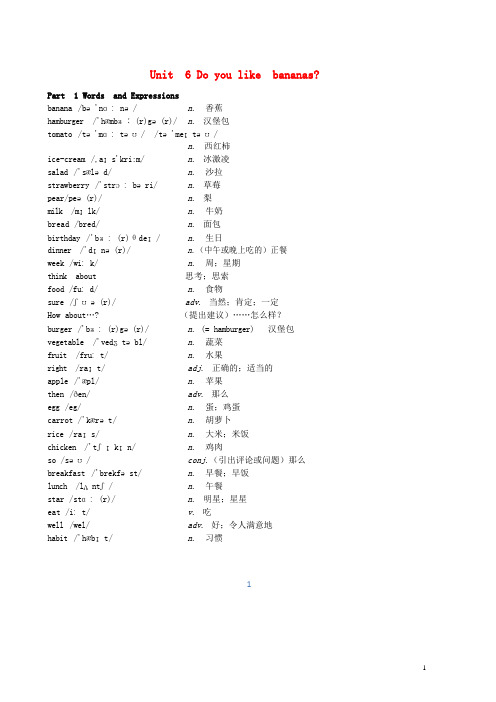
Unit 6 Do you like bananas?Part 1 Words and Expressionsbanana /bə'nɑːnə/ n. 香蕉hamburger /'hæmbɜː(r)gə(r)/ n. 汉堡包tomato /tə'mɑːtəʊ/ /tə'meɪtəʊ/n. 西红柿ice-cream /,aɪs'kri:m/ n. 冰激凌salad /'sæləd/ n. 沙拉strawberry /'strɔːbəri/ n. 草莓pear/peə(r)/ n. 梨milk /mɪlk/ n. 牛奶bread /bred/ n. 面包birthday /'bɜː(r)θdeɪ/ n. 生日dinner /'dɪnə(r)/ n.(中午或晚上吃的)正餐week /wiːk/ n. 周;星期think about 思考;思索food /fuːd/ n. 食物sure /ʃʊə(r)/ adv. 当然;肯定;一定How about…?(提出建议)……怎么样?burger /'bɜː(r)gə(r)/ n. (= hamburger) 汉堡包vegetable /'vedʒtəbl/ n. 蔬菜fruit /fruːt/ n. 水果right /raɪt/ adj. 正确的;适当的apple /'æpl/n. 苹果then /ðen/adv. 那么egg /eg/ n. 蛋;鸡蛋carrot /'kærət/ n. 胡萝卜rice /raɪs/ n. 大米;米饭chicken /'tʃɪkɪn/ n. 鸡肉so /səʊ/ conj.(引出评论或问题)那么breakfast /'brekfəst/ n. 早餐;早饭lunch /lʌntʃ/ n. 午餐star /stɑː(r)/ n. 明星;星星eat /iːt/ v. 吃well /wel/ adv. 好;令人满意地habit /'hæbɪt/ n. 习惯1healthy /'helθi/adj. 健康的really /'riːəli/ adv. 真正地question /'kwestʃən/ n. 问题want /wɒnt/ v. 需要;想要be /biː/ v. 变成fat /fæt/adj. 肥的;肥胖的Part 2:Texts课文(一)Jack: Hey, John’s birthday dinner is next week. Let’s think about the food.Tom: Sure. How about burgers, vegetable salad, and some fruit? Bill: Sounds good. John likes hamburgers.Jack: Oh, I don’t like salad.Bill: But John likes salad, and it’s his birthday.Jack: Yes, you’re right. What about the fruit?Tom: I think John likes strawberries and apples.Jack: OK. Let’s have strawberries and applesthen.Structure——谈论好恶1.Do you like salad? Yes, I do./No, I don’t.2.Do they like pears? Yes, they do./ No, they don’t.3.Does she like tomatoes? Yes, she does./ No, she doesn’t.4.I like oranges. I don’t like bananas.5.We like rice. We don’t like hamburgers.6.He likes ice-cream. He doesn’t like vegetables.重点句型:—Do / Does sb. like…?—Yes, sb. do / does.—No, sb. don’t / doesn’t.sb. like/likes ….sb. don’t/doesn’t like ….Underline the correct words in the brackets.在括号内正确的单词下画线。
七年级英语上册-Unit6-Do-you-like-bananas课件-人教新目标版

a banana s
a hamburger s
a tomatoes
broccoli
French fries
an orange s
ice cream
a strawberry ies
a pears
salad
Let’s have a big meal.(让我们大吃一顿.)
Explanation
1. Running star Sandra Clark eats lots of healthy food. some , many , lots of , a lot of 的区别 (1) some 意思是 “一些”, 可以修饰 可 数名词,也可以修饰不可数名词。 如:some friends 一些朋友 some water 一些水
Sandra: No, I don’t like vegetables.
Well, only salad. I like
salad. But I like fruit. I like
bananas, oranges…
Tom: How about apples? I don’t like apples!
hamburgers
French fries
ice cream
tomatoes
broccoli
strawberry strawberries salad
/e/ e
pears
bananas
oranges
/ e/
1a Match the words
1. hamburgers 2. tomatoes 3. broccoli 4. French fries 5. orange 6. ice cream 7. salad 8. bananas 9. strawberries 10.pears d g a h e f c b i j
新目标人教版七年级英语上册Unit 6 Do you like bananas Section A (1a—1c)优秀说课稿

新目标人教版七年级英语Unit6 Do you like bananas? Section A (1a—1c)说课稿说课教师:授课班级:授课时间:今天我说课的内容是新目标人教版七年级Unit6 Do you like bananas? Section A ( 1a-1c). 我将从教材分析、教学目标、教学重难点、教学过程四个部分进行说课。
一、说教材分析:本单元既是新知,也是对旧知的复习与提升。
在Unit5 这个单元中,学生学过Do you have…?Yes, I do. / No, I do n’t. 的句型,并初步掌握了一般疑问句的结构及答语。
而我所执教的Unit 6 这一单元,Do you like…?是要求学生们能够询问别人是否喜欢某物。
两个单元具有相似点:Do you …? Yes, I do. / No, I do n’t.的句型来询问并应答;同时又具有不同点:谈论话题不同,第5单元以体育用品为主题谈论某人是否拥有某物,而第6单元则以食物为主题谈论个人喜好;知识词汇不一样;情感态度价值观不同。
二、说教学目标:A.知识与技能:1、关于水果的词汇;表达喜好的结构;能听说、认读单词:apples, milk, salad, tomatoes, bread, hamburgers….2、掌握句型:Do you like …?及回答Yes, I do. / No, I do n’t.B.过程与方法:1、通过创设情境,歌谣,游戏等活动,学会询问别人喜欢或不喜欢的食物,如:Do you like …?并能作出应答。
2、能够和组员合作,通过演一演的方式把知识内化。
C.情感、态度与价值观:1、情感态度:该部分学习内容贴近学生的生活,谈论的主题涉及学生的饮食习惯和偏爱,极易于激发学生学习英语的欲望和兴趣。
2、学习策略:采取小组合作学习的方式,培养同学间相互沟通和交流的能力。
三、说教学重难点:根据教学大纲要求,教材编排特点,并从学生的实际出发,我将本课的重点与难点确定为:重点:1、关于食物的词汇;能听说、认读单词:apples, milk, salad, tomatoes, bread, hamburgers….2、掌握句型:Do you like …?及应答:Yes, I do. / No, I do n’t.难点:根据创设情境运用句型“Do you like …?”及应答。
人教版七年级英语上册七年级英语Do_you_like_bananas课件
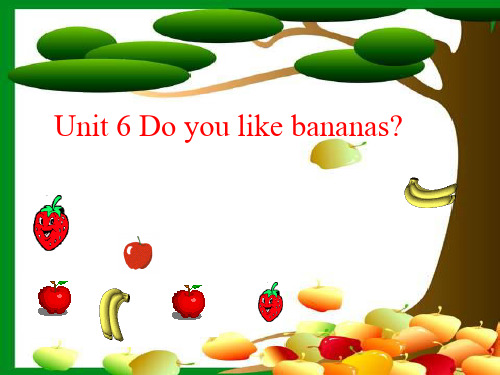
1.----__B__
you
Check yourself
like bananas?
-----Yes, I do.
A. Does B. Do C. Are D. Is
2.----Do you like hamburgers?
----______A______.
A. No, I don’t. B. Yes, I likes.
5. I like ice cream (改为否定句). ___I___ __d_o_n_’_t like ice cream.
6. Do you like bananas?(作否定回答) __N__o__, ____I__ ___d_o_n_’_t .
任务型阅读
根据材料,请找出Jim Green 为家人准备的晚餐,并填写表格。
Class 8,Grade 1 Nov 25,2004
Groupwork: How many other words can you add to the lists?(四人一组写出其它单词, 可用词典,看哪组写得最多)
fruits
apples,
vegetables broccoli,
breakfast
Unit 6 Do you like bananas?
an apple apples
chicken
carrot s
an egg eggs
Look at the pictures for 2 minutes, then say the food words.(看图两分 钟,说出食物名称)
_______, You are today’s king of words.
some salad
人教版七年级英语上册Unit6Doyoulikebananas教案

人教版七年级英语上册Unit6 Do you like bananas教课设计课题Unit 6 Section A 1a /1b /1c /2a /2b.课型New一、知识与技术:1)单词:do,don ’ t,does,doesn’ t,strawberries,like,have,bamburgers,orange,tomatoes,icecream,broccoli,salad,French fries, bananas.2)句型: Do you like bananas?教课目的Yes, I do. \ No, I don’ t.经过学习本课,学生能够用英语相互议论喜爱与不喜爱的食品。
二、过程与方法:1)睁开多种任务型的听力活动,获取理解、辨别和办理与讨论爱好、憎恶有关的信息。
2)经过小组议论、睁开检查等研究,明确在用中学、沟通中学习的想法。
三、感情态度价值观:议论美食,享受生活美味,倡导健康合理饮食。
教课要点掌握对于食品的词汇。
教课难点学会使用社交用语 Do you like bananas? Yes,I do.\ No, Idon ’ t.课前准备录音机、多媒体课件教课过程:设计企图Step1. Warming upStep 2 Presentation经过让学生猜冰箱里有哪些食品的形式,导出新的单词。
同时让全体学生拼读每个单词、让个别学生将单词写到黑板上。
Step3.Task 1部署一项任务:老师手持一个盒子, 让同学猜猜老师最喜爱的食品.规则为学生只好问老师问题而老师只用“Yes”或“No”回答。
达成 Section A, 1a, 1b.Step 4. Task 2部署拓展性任务:要求同桌学生合作编一个小型对话,主题为咨询他人喜爱或不喜爱的食品。
要求使用刚学过的食品类单词以及句型,同时也能够适合地加入课外单词(老师请一程度较好的学生先进行示范)。
Step 5.达成课文32 页 Section A 听力练习activity 2a, 2b.Setp 6.当堂听写听写单词与句型,进一步稳固本课学习内容,并将本课应掌握的单词和句型落实到“写”上,使学生不只会说同时会写。
人教版七年级上册英语Unit6Doyoulikebananas
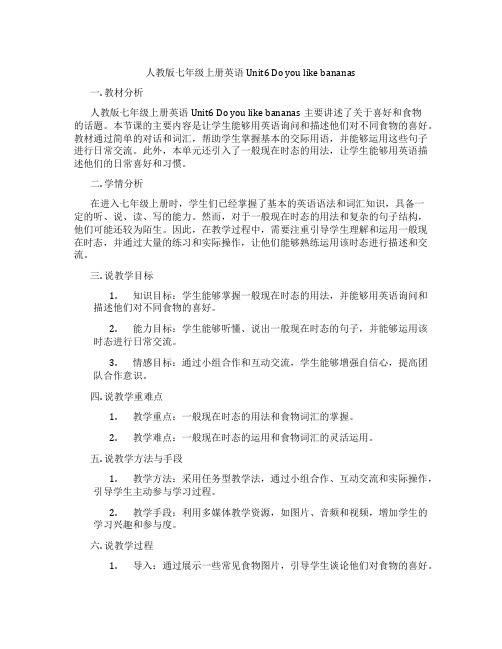
人教版七年级上册英语Unit6 Do you like bananas一. 教材分析人教版七年级上册英语Unit6 Do you like bananas主要讲述了关于喜好和食物的话题。
本节课的主要内容是让学生能够用英语询问和描述他们对不同食物的喜好。
教材通过简单的对话和词汇,帮助学生掌握基本的交际用语,并能够运用这些句子进行日常交流。
此外,本单元还引入了一般现在时态的用法,让学生能够用英语描述他们的日常喜好和习惯。
二. 学情分析在进入七年级上册时,学生们已经掌握了基本的英语语法和词汇知识,具备一定的听、说、读、写的能力。
然而,对于一般现在时态的用法和复杂的句子结构,他们可能还较为陌生。
因此,在教学过程中,需要注重引导学生理解和运用一般现在时态,并通过大量的练习和实际操作,让他们能够熟练运用该时态进行描述和交流。
三. 说教学目标1.知识目标:学生能够掌握一般现在时态的用法,并能够用英语询问和描述他们对不同食物的喜好。
2.能力目标:学生能够听懂、说出一般现在时态的句子,并能够运用该时态进行日常交流。
3.情感目标:通过小组合作和互动交流,学生能够增强自信心,提高团队合作意识。
四. 说教学重难点1.教学重点:一般现在时态的用法和食物词汇的掌握。
2.教学难点:一般现在时态的运用和食物词汇的灵活运用。
五. 说教学方法与手段1.教学方法:采用任务型教学法,通过小组合作、互动交流和实际操作,引导学生主动参与学习过程。
2.教学手段:利用多媒体教学资源,如图片、音频和视频,增加学生的学习兴趣和参与度。
六. 说教学过程1.导入:通过展示一些常见食物图片,引导学生谈论他们对食物的喜好。
2.新课呈现:引入一般现在时态的概念,并通过示例句子让学生理解一般现在时态的用法。
3.对话练习:让学生听录音或观看视频,模仿对话中的句子,并进行角色扮演。
4.小组活动:学生分组进行讨论,用英语询问和描述他们对食物的喜好。
5.巩固练习:通过完成练习题和互动游戏,让学生进一步巩固一般现在时态的用法。
人教版英语七年级上册 Unit 6 Do you like bananas

This is a fruit and vegetable house (果疏屋). What’s in the house? (果蔬屋里有什么?)
some vegetables
some fruits
banana bananas
pear pears
strawberry strawberries
2 A: Do you like salad? B: No, I don’t.
1 A: Do you like bananas? B: Yes, I do.
3 A: Do you like oranges? B: Yes, I do.
Post-listening
1c Practice the conversations with your partner. Then make your own conversations.
2. tomatoes __i _ 3. oranges _f__ 4. ice-cream _h__ 5. salad __b_ 6. bananas _g__
7. strawberries __c_ 8. pears __j_
9. milk __e_ 10. bread _a__
Read the dialogue in the picture.
Read the conversation after the tape.
1. Girl: I like hamburgers. Do you like hamburgers? Boy: Yes, I do.
2. Girl: Do you like tomatoes? Boy: No, I don't like tomatoes.
—Do you like bananas? —Yes, I do. —Do you like salad? —No, I don’t. —Do you like oranges? —Yes, I do.
英语七年级上册Unit6Doyoulikebananas人教版七年级上unit6课件

I couldn’t think of the name of that man. 我想不出那人的名字来了。
Let’s think of some questions about life. 让我们对生活设想一些问题吧。
4. sure adv. (副词)当然;肯定;一定 常用来回答一般疑问句,意为“当然; 的确”,相当于yes或certainly。只是 sure 在英国英语中较为常用,而在美国 英语中常用certainly。
Jack: Hey, John’s birthday dinner is next week.
Let’s think about the food.
Tom: Sure. How about burgers, vegetable salad,
and some fruit?
2d
Bill: Sounds good. John likes hamburgers.
last week 上礼拜
this week 本周
next week 下周
3. think about 思考,思索
(一般是短时间的较仔细的考虑) What do you think about that? 你认为怎么样? I’ll have to think about it. 我得想一想。
think of 想到;想象;设想 多用来指“想起,认为”。
Countable nouns Uncount- Countable and
able uncountable
nouns nouns
hamburgers, e_g_g_s milk _o_r_a_n_g_e_s__a_p__p_le_s_ bread _b_a_n_a_n__a_s__p_e_a_r_s_ rice _ca_r_r_o_t_s__t_o_m_a__to_e_s _v_e_g_e_t_a_b_le_s______
七年级英语Unit 6 Do you like bananas知识精讲

七年级英语Unit 6 Do you like bananas?【本讲主要内容】Unit 6 Do you like bananas?通过本课的学习我们应该能做下面的事:1. Learn to talk about likes and dislikes. 学习谈论好恶。
2. Learn the names of foods.学习一些食品的名称。
3. Talk about meals. 谈论三餐。
【知识掌握】【文化背景】1. 美国人的饮食习惯通常美国式饮食不讲究精细,追求快捷方便,也不奢华,比较大众化。
一日三餐都比较随便。
早餐以面包、牛奶、鸡蛋、果汁、麦片、咖啡、香肠等为主。
午餐一般在工作地点用快餐(快餐是典型的美国饮食文化,十分普及),一般有三明治、水果、咖啡、汉堡包、热狗等。
晚餐是正餐,比较丰盛,有一二道菜,如牛排、猪排、烤肉、炸鸡等,配面包、黄油、青菜、水果、点心等。
也有不少人上餐馆用晚餐。
美国餐馆很多,一般供应自助餐、快餐、特餐(固定份饭)、全餐等各种形式的餐饮,价格一般比较低廉,也可点菜,点菜价格最高。
早餐一般在8时左右,午餐一般在12时-14时,晚餐一般在18时左右。
他们在临睡前有吃点心的习惯,成人以水果、糖果为主,孩子则食用牛奶和小甜饼。
2. 做客进餐在有些文化中,作为客人去接受首次提供的食物是不礼貌的。
介于这个原因,到美国来访的客人有时会在主人首次邀请进食时说“不”。
他们期待主人再次邀请。
然而,在美国,主人会认为客人真不想吃了。
因此,当你在美国人家做客时,一定记住要如实地说出想要或不想要。
当然当你被邀到某人家去共进餐时,你不喜欢所提供的一些食品时,你可以不去吃它。
然而,你不要让人觉得你很讨厌那些食物。
如果可能的话,对每样食品都多少吃一点儿。
当然,挑你喜欢的吃两样,把其他的留在盘中也可以。
【词汇用法】1. lots of = (a lot of)许多;大量;很多既可以修饰可数名词,又可以修饰不可数名词。
七年级英语Unit 6Do you like bananas 人教版(新目标)知识精讲

初一英语Unit 6 Do you like bananas? 人教版(新目标)【本讲教育信息】一. 教学内容:Unit 6 Do you like bananas?(一)语言目标谈论爱好和厌恶。
(二)语言功能学会用英语表达自己喜欢或不喜欢的东西,询问别人是否喜欢,提出建议。
(三)重点句型Do you like bananas? Yes, I do./No, I don’t.I like French fries. I don’t like tomato es.(四)主题词表(五)重点词汇及短语词汇:like, hamburgers, tomatoes, broccoli, French fries, oranges, ice cream, salad, bananas, eggs, carrots, strawberry, apples, chicken, breakfast, lunch, dinner, fruit, vegetable.短语:a lot of like to do sth. like doing sth.(六)语法1. 动词like的用法。
2. 一般疑问句的肯定、否定回答。
3. 名词复数的使用。
(七)重难点分析:1. 可数名词和不可数名词(1)可数名词:①定义:是可以计数的名词。
②可数名词前可以用a,an限定。
③可数名词前可以用one,two,three…限定。
④可数名词有复数形式。
(2)不可数名词:①定义:指不能计数的名词。
②不可数名词前不可以用a,an限定。
③不可数名词前不可以用one,two,three…限定。
④不可数名词没有复数形式。
2. 一般名词的复数形式(1)一般在名词词尾加-s。
如:banana-bananas(2)以-o,-s,-sh,-ch及-x结尾的名词,在词尾加-es构成复数形式。
如:tomato-tomatoes (3)有些以-o结尾的名词仍加-s。
人教新版英语七年级上册Unit6说课稿

人教新版英语七年级上册Unit6说课稿尊敬的领导、同事,今天我要说的是人教版七年级英语上册Unit6 Do you like bananas?的第一课时。
本单元的中心话题是食物,主要语言功能项目是谈论喜好和厌恶,语法结构是现在时的to like,Yes/No问题和短回答。
n A的内容从呈现食物词汇开始,通过听、说、读等方式输入信息,并引出了本单元的主要句型:Do you like…?及其肯定回答Yes。
I do./否定回答No。
I don’t。
教学目标:学生能够掌握单词如hamburger,French fries,salad,ice cream,tomato,broccoli等等。
能够用英语谈论自己喜欢和不喜欢的食物。
通过丰富多彩的活动,让学生体会研究英语的快乐,谈论美食,享受生活美味。
了解中西方膳食的不同。
教学重点:1.掌握关于食物的词汇。
2.熟练运用所学功能项目谈论喜好和厌恶。
教学难点:1.交际用语Do you like…?肯定回答Yes。
I do.否定回答No。
I don’t。
第三人称单数:Does she/he like…?肯定回答Yes。
she/he does.否定回答No。
she/he XXX.一般现在时,主语是三单时,助动词与动词的变化。
3.掌握可数名词单,复数和不可数名词的区别。
教学方法和研究策略:以多媒体辅助教学,实物展示贯穿整个教学,增加直观性和趣味性,提高教学效果。
通过听、说、读、写、竞赛等多种类型的任务活动,增强学生合作意识和自主研究。
为了完成教学目标,达到培养学生的综合素质的目的,整个教学过程设计力求发挥学生的主体作用。
积极倡导自主、合作、探究的研究方式,并体会到成功。
教具准备:本课以多媒体课件为辅助教学手段。
生们已经被吸引住了。
为了让学生更好地理解和掌握新知识,教师通过提问的方式引导学生逐步掌握关于食物的单词和语法知识。
5.实物展示。
教师拿出苹果,香蕉,梨和桔子等水果进行实物展示,让学生通过观察和感受来了解这些水果的外观和口感特点。
人教版七年级英语上册教学课件:Unit 6 Do you like bananas(共90张PPT)
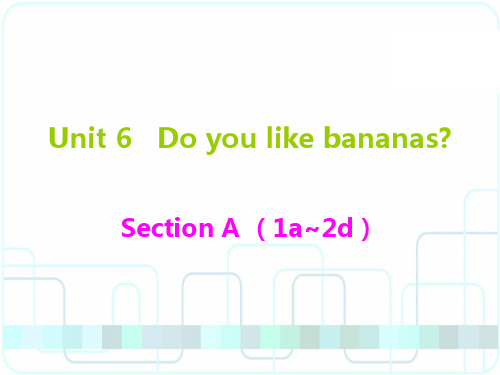
课堂练习
三、根据汉语意思完成句子,每空一词 1. 你喜欢草莓吗? Do you ___li_k_e__ ___s_tr_a_w_b__e_rr_ie_s___? 2. ——你喜欢苹果吗? ——不,我喜欢梨。 —Do you __li_k_e__ __a_p_p_le_s_? —No, I __d_o__n_'t__. I __li_k_e__ __p_e_a_r_s__.
Unit 6 Do you like bananas?
Section A (1a~2d)
课前导学
核心单词 1. ___b_a_n_a_n_a____ n. 香蕉 2. ____h_a_m_b_u_r_g_e_r____ n. 汉堡包 3. ____t_o_m_a_t_o____ n. 西红柿 4. ___i_c_e_-c_r_e_a_m____ n. 冰激凌 5. ____s_a_l_a_d___ n. 沙拉 6. __s_t_r_a_w_b_e_r_ry____ n. 草莓 7. ____p_e_a_r____ n. 梨 8. ____m_i_lk______ n. 牛奶
要点梳理
2. sure的用法 【教材例句】—Let's think about the food. 让我们来 想想(吃什么)食物吧。 —Sure. 当然。 (教材第32页) 【要点思维导图】
要点梳理
【举例】 —Can you help me? 你能帮我吗? —Sure. 当然可以。 I am sure he can come to my birthday party. 我确信 他会来参加我的生日聚会。
要点梳理
2 句型“How about …?”的用法 【教材例句】How about burgers, vegetable salad, and some fruit? 汉堡包、蔬菜沙拉和一些水果怎么样? (教材第32页) 【用法】“How about …?”意为“(提出建议)…… 怎么样?”,用于提出建议或请求,相当于“What about …?”,其中about为介词,后接名词、代词或 动词-ing形式。
Unit6Doyoulikebananas(1)PPT课件(人教版英语七年级上册)

Can you tell John what Tom and Sally like and don’t like to eat?
Tom Sally
Likes
carrots, salad, all vegetables
salad, fruit (bananas, oranges, apples), ice-
8. pears j 9. milk e 10. bread a
初中英语
Sally talks about what she likes to eat.
Sally: I like
. Do you like
?
Tom: Yes, I do.
初中英语
What does Sally like to eat?
Likes
Tom Sally
carrots, salad, all vegetables
Doesn’t like apples
初中英语
初中英语
What do they like and what don’t they like to eat?
Likes
Tom Sally
carrots, salad, all vegetables
初中英语
初中英语
If you want to invite your classmates to your party, how do you find out what they like and don’t like to eat?
• Do you like …? • What’s your favorite fruit/vegetable/drink? • Do you enjoy …? • How about some …?
- 1、下载文档前请自行甄别文档内容的完整性,平台不提供额外的编辑、内容补充、找答案等附加服务。
- 2、"仅部分预览"的文档,不可在线预览部分如存在完整性等问题,可反馈申请退款(可完整预览的文档不适用该条件!)。
- 3、如文档侵犯您的权益,请联系客服反馈,我们会尽快为您处理(人工客服工作时间:9:00-18:30)。
Unit 6 Do you like bananas
主讲教师:朱文娟北京英语教师
重难点精讲
Ask about likes and dislikes . 询问好恶。
询问别人喜欢什么的时候要用下面句型。
a. ——Do you like……?
——Yes , I do. / No , I don’t.
b. ——Do they like……?
——Yes , they do. / No , they don’t.
c. ——Does he like……?
——Yes , he does. / No , he doesn’t.
d.——Does she like……?
——Yes , she does. / No , she doesn’t.
Talk about likes and dislikes. 谈论好恶。
I like tomatoes. I don’t like potatoes.
我喜欢吃西红柿。
我不喜欢吃土豆。
They like bananas. They don’t like oranges.
他们喜欢香蕉。
他们不喜欢桔子。
He likes ice cream. He doesn’t like apples.
他喜欢冰淇淋。
他不喜欢苹果。
She likes vegetables. She doesn’t like hamburgers .
她喜欢吃蔬菜。
她不喜欢吃汉堡。
※基础知识闯关
词汇V ocabulary 语法
Grammar
Types of food Food names
1vegetables
2fruit
3meat
4dessert
※词汇闯关第一关
Quick Mind
Which one is different from others?
ice-cream a pple banana orange
breakfast eat dinner lunch
vegetable carrot tomato potato
interesting really fun boring
题一:
She doesn’t want to be f______, so she e_____ like a bird. It’s not h__________.
首字母填空
A: You don’t l_______ eggs?
What a ________chicken?
B: Oh, I like chicken.
题二:
首字母填空
A: Do you like salad?
B: Yes, I ______. How about you?
A: Well, I ________ ________ vegetable salad, but I like fruit salad.
A: _______ your brother like carrots?
B: No, ________ ________.
A: Does Mary like drinking coffee?
B: Yes, she does. But she________ like tea.
A: _______ your grandparents have rice for dinner?
B: Yes, they _______.
题三:
Your father ________(want) to ask you some questions.
We ________(watch) sports games and _______(play)
sports together.
A:_______ Liz ______(play) tennis every week?
B: Yes, she ________.
题四:
We have ________ at 11:30. After that, we
have a short break.
A. breakfast
B. lunch
C. dinner
D. supper
题五:
Where _________ your brother usually ______ lunch?
A. do, have
B. are, eat
C. does, has
D. does, have
能力提升与拓展
题六:
I’m Dave. I am __1__American student. I study in Beijing. I like Beijing very much. I like to go to the
Great Wall. I also __2__ Chinese food. For breakfast, I like eggs, milk and fruit. For lunch, I like rice and chicken. For __3__, I have some steamed bread and tomato soup with eggs. Chinese food __4__ very good! But I don’t like to use chopsticks because it is so __5__ to use them!
1. A. a B. an C. the D. /
2. A. like B. likes C. don’t like D. doesn’t like
3. A. me B. dessert C. breakfast D. dinner
4. A. are B. am C. is D. /
5. A. interesting B. boring C. difficult D. fun
题七:
连词成句
1. your/ salad/ like/ does/ brother/?
2. do/to/want/not/eat/for/bread/I/breakfast/.
翻译句子
我们餐前吃点水果沙拉吧!
我喜欢吃水果和蔬菜,但不喜欢鸡蛋和牛奶。
你有健康的饮食习惯吗?
Unit 6 Do you like bananas
讲义参考答案
重难点精讲
题一:fat; eats; healthy; like; about
题二:do; don’t like; Does; he doesn’t; doesn’t; Do; do
题三:wants; watch; play; Does; play; does
题四:B
题五:D
能力提升与拓展
题六:BADCC
题七:Does your brother like salad?
I don’t want to eat bread for breakfast.
Let’s eat fruit salad before dinner.
I like eating fruit and vegetables, but I don’t like eggs and milk.
Do you have a healthy eating habit?。
